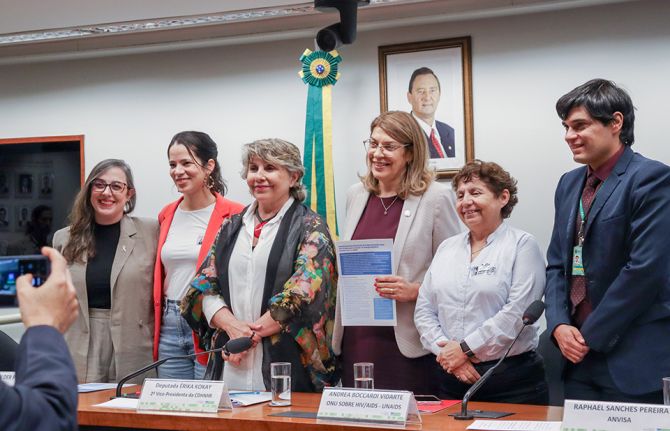
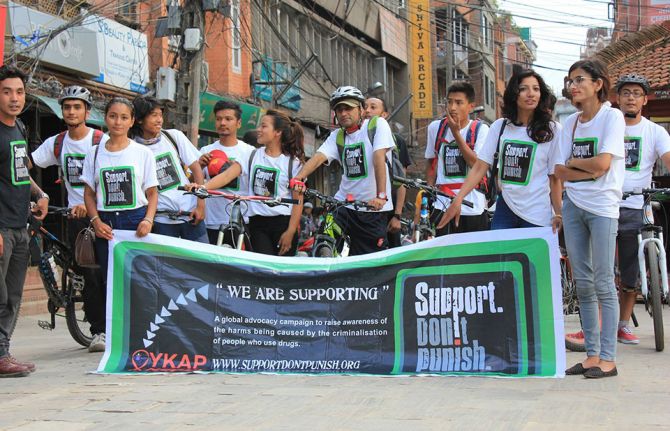

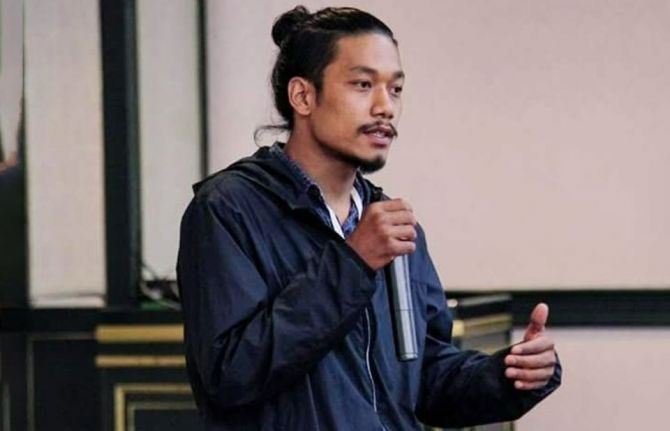
Feature Story
Demanding more options for young people who use drugs in Nepal
26 June 2023
26 June 2023 26 June 2023“Drugs were a way to escape from reality. But because of it, I have faced a lot of discrimination,” said Yukusna Kurumbang. “After a while I had no one around me. No friends I could contact. I have my family but they do not trust me. I am trying to improve.”
There aren’t many resources at Ms. Kurumbang’s disposal. She’s fashioned her own path to recovery including volunteering with YKP Lead Nepal—a youth-led organisation.
“I’m investing in myself and others to escape drugs,” she explained. “I’m trying to control my mind.”
The organisation’s President, Rojal Maharajan, recalls the feeling of isolation he too faced while using: “It’s very humiliating—the gossiping and negative comments. My family also got sick and tired of me. Eventually I had no one to tell about my problems and my mental health status.”
He started his advocacy eight years ago after a successful rehabilitation stint.
“I wanted to do this work to make sure young people who use drugs are treated as human beings. They deserve to have a good life and better opportunities,” he said.
These deeply personal perspectives help YKP Lead Nepal respond to the addiction challenge facing Nepal’s youth. And it’s a complex challenge.
There was a 2021 review of the human rights situation of people who use drugs in Nepal by the International Drug Policy Consortium, Recovering Nepal, YKP LEAD Nepal and Youth Rise International. It notes that the Narcotic Drugs Act criminalises not only drug possession, but addiction itself. According to a 2019 survey of people who use drugs, almost half had been arrested for drug use or a related offence. Among people who injected drugs the arrest rate shot up to 63%.
Treatment for drug dependence is privatised and inaccessible to most, including residents of border towns where services are most scarce. Among those who have had access to drug treatment, one in ten reports having experienced ill-treatment, violence and even torture.
The Government of Nepal has made progress around the provision of harm reduction services including needle and syringe programmes and opiate agonist therapy (OAT). However there are allegations that police frequently harass and detain people visiting these facilities.
“Punitive drug policies across the region have created a culture of violence and impunity by law enforcement,” said Ikka Noviyanti, Regional Coordinator of Youth LEAD, the Asia and the Pacific young key population network. “This makes it more difficult for people to reach the range of prevention and treatment services they need to stay safe. The situation is even more dire for youths.”
A 2019 Ministry of Home Affairs survey determined that over three-quarters of people who use drugs in Nepal are under age 30. Another study found that one-third of young people who use drugs started before age 15, with almost half commencing drug use between 15 and 19. The advocates say that in lieu of heroin which is expensive, there’s a growing trend of young people mixing and injecting tranquilizers like Diagepam, Nitrazepam and Dormin.
Injecting drug use increases the risk of abscesses as well as illnesses including HIV, Hepatitis B and C. HIV prevalence for injecting drug users is 3% for males and 2% for females. By comparison, Nepal’s adult general population HIV prevalence is 0.1%. YKP Lead Nepal is advocating for disaggregated data so they can better grasp the scale of the HIV burden carried by young people.
The organisation shares safety information with clients along with clean needles and syringes. During the Covid-19 lockdowns, for example, they home delivered both food and harm reduction packages. Their outreach includes homeless young people.
But the advocates say that even when clients are aware of the risks, there are barriers to staying safe.
“Most of them don’t want to go to the service sites,” Mr Maharajan explained. “Many of the young women have told us they are harassed at the OAT clinics. Others have a concern that the people running the needle exchange programmes are from rehabs. They don’t want to be forced to go (to rehab) because they are fearful of torture.”
UNAIDS Country Director for Nepal, Masauso Nzima, says that the Government of Nepal has made a move in the right direction with its investment in harm reduction services. However, more needs to be done to ensure a people-centred approach to drug policies “if we are to make a sustained difference in the lives of young people”.
“A critical step is the adoption of laws that treat drug dependence as a health condition rather than a crime. Action is also needed to outlaw torture and ill treatment, holding violators accountable and providing increased oversight for rehabilitation centres. Finally, we are advocating for expanded access to drug treatment and harm reduction programmes, without discrimination,” Mr Nzima said. “That means young people, women and people living in all parts of the country should have equitable access.”
YKP Lead Nepal goes a step further, calling for designated days for young women to access harm reduction services and for young people to be among the service providers.
With support from UNAIDS Asia Pacific, Youth LEAD is now piloting a “Regional Healthcare Worker Training Manual: Friendly HIV and SRHR services for young key populations in Asia Pacific”. The approach is meant to address the multiple barriers to young key populations accessing services including concerns about privacy and confidentiality, stigma and discrimination among healthcare providers, inconvenient opening hours and service packages that do not speak to their specific needs.
“Young people account for one of four new HIV infections in Asia and the Pacific,” Ms. Noviyanti said. “We are failing young people. But with targeted investments for youth-led responses and action we can turn the tide.”
Region/country


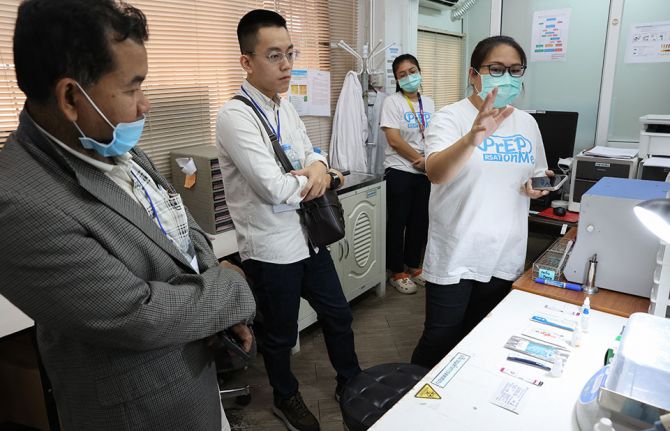
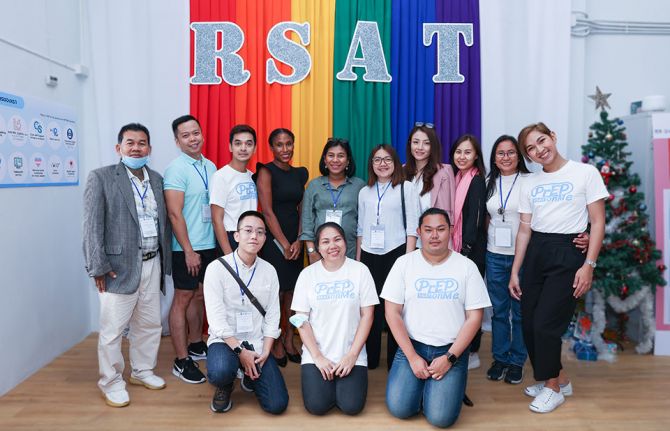
Feature Story
How to build stigma-free key population services
23 June 2023
23 June 2023 23 June 2023At his previous factory job, Tom Wang (not his real name) says coworkers gossiped about his sexuality and made fun of him. When he visited a public health facility for an HIV test, the nurse peppered him with questions like “Why do you need it? Have you been sleeping with many partners?”
Thailand is a country famed for its tolerance. It is among the world’s top locations for gender affirming care. Same-sex sexual activity hasn’t been criminalised since 1956. And the policy tide is turning on other key population issues. A 2021 Drug Law allows for harm reduction as opposed to automatic imprisonment, while a bill is in the pipeline to affirm the rights of sex workers. Yet stigma and discrimination persist. In homes, communities, schools, workplaces and—critically—healthcare settings, discriminatory attitudes can take their toll.
“Microaggressions—intentional or unconscious verbal or behavioural slights toward stigmatised groups—can drive people away from HIV prevention and treatment,” noted UNAIDS Regional Human Rights and Law Adviser, Quinten Lataire. “There are evidence-based approaches for measuring and lowering both overt and subtle stigma and discrimination in healthcare settings.”
It was this need for stigma-free services that led to the establishment of the Rainbow Sky Association of Thailand (RSAT). RSAT offers sexual healthcare for men who have sex with men, migrants, people who use drugs, sex workers and transgender people. It also advocates for the full rights and equity of lesbian, gay, bisexual and transgender (LGBT) communities. Tom Wang is amongst the clients who have benefited from their support.
This work is critical if HIV programmes are to reach and retain key population communities. In Thailand, as in the rest of Asia, these groups carry the heaviest HIV burden. Nationally HIV prevalence is 1% for sex workers, 8% for people who use drugs, 11% for transgender women and 12% for men who have sex with men.
A one stop shop for sexual health services
RSAT’s approach demonstrates how programmes can improve outcomes by implementing strategies to affirm and empower clients. They are jointly supported by PEPFAR, USAID, EpiC, the National Health Security Office (NHSO) and Thailand’s Institute of HIV Research and Innovation (IHRI).
There are no depressing charts or drab walls at their five key population clinics. At the Bangkok site the rainbow motif appears on the floors and walls. There are swarms of cut-out butterflies. Signs are either upbeat and multi-coloured or a soothing blue.
Most of the staff are themselves members of key population groups. All staff receive anti-stigma and discrimination training which even addresses the fine point of body language. Nothing about staff’s interactions should make a client feel judged or uncomfortable. The entire team is retrained annually. There is an internal complaint mechanism that allows clients to confidentially flag issues, as well quality assurance staff to ensure Standard Operating Procedures are followed. Every team member signs a confidentiality agreement.
RSAT’s service package includes on-site testing for HIV and other sexually transmitted infections, Hepatitis C, Tuberculosis and Covid-19. For transgender clients they offer hormone level monitoring. Mental health screenings which evaluate for depression, anxiety and stress have been integrated into the HIV service package. Where required, clients are referred for additional mental healthcare.
“Many of our clients engage in chem sex (recreational drug-use during intercourse). Some clients inject meth so we need to provide more than condoms. They also need clean syringes and needles which are part of our harm reduction package,” said Deputy Director, Kao Kierati Panpet.
Pre- and post-test counselling are critical. All counsellors are certified and accredited by the Ministry of Public Health according to Counsellor Supervisor, Sasiprapha Khamthi. Even before receiving HIV test results, clients know that treatment is available. Following a positive test, the counsellors reassure clients that with treatment they can live a normal life, explained Niphon Raina, Care and Counselling Supervisor.
“We also ask what their concerns are and give basic information about how HIV is and is not transmitted, using a picture book so they are clear on the facts,” Care and Counseling Officer, Bussarin Poonvisitkun added.
RSAT keeps a stock of antiretroviral therapy drugs onsite and can initiate new clients’ treatment on the day of diagnosis by giving them one month’s supply. Although HIV care is provided at the Ratchaphiphat Hospital, RSAT is able to dispense right away in accordance with instructions from a hospital doctor, delivered via telemedicine. Clients living with HIV receive help from the care and support team to navigate their next steps, including attending hospital visits.
RSAT also provides pre-exposure prophylaxis or PrEP services with hospital supervision. Mr. Tom Wang explains how this has protected his health: “I decided to get on PrEP because I am changing partners. To me PrEP is another means of protection in case you are intoxicated or the condom breaks. It’s a way to ensure I stay HIV-free.”
A redress mechanism for rights violations
The organisation advocates for structural changes to eliminate stigma and discrimination. For example, they are currently making recommendations for the Gender Recognition Draft Bill.
“But the reality is that policy and legal changes take a lot of time,” said RSAT Director, Tanachai Chaisalee.
While this longer-term work proceeds, a redress mechanism helps clients address current concerns. RSAT is tapped into the Crisis Response System (CRS) initiated by the Ministry of Public Health in collaboration with the Office of the Attorney General, Ministry of Justice. People with complaints about prejudice or rights violations in any sphere can scan a QR code and report their experience. Reports may also be sent via Facebook, email or LINE, Thailand’s answer to WhatsApp. A multi-disciplinary team conducts investigations and works with the client and other stakeholders to help.
The lion’s share of reports made via RSAT come from transwomen (78%) while gay men have lodged 17% of reports. The most common challenges relate to requirements for gender confirming attire, social exclusion (particularly during job application processes) and HIV status.
RSAT’s Human Rights Manger, Watcharawit Waraphattharanon, shares that they have been able to resolve some cases very quickly. For instance, if a person living with HIV is being forced to take an HIV test as a requirement for work, the Attorney General’s office does an emergency intervention.
“We can close these cases within one week,” he said.
“The work of key population-led, community-based organisations like RSAT is critical to reach those who most need HIV services,” UNAIDS Country Director, Patchara Benjarattanaporn stressed. “The Government’s progress in funding Community-led Health Services and building partnerships between these organisations and the public health system puts us on the path to end AIDS.”
A group of journalists visited the Ozone Foundation as part of the UNAIDS, UNDP, APN Plus and USAID/PEPFAR Southeast Asia Regional Workshop on HIV-related Stigma and Discrimination in Bangkok, Thailand on June 8, 2023. Learn more about this novel training
Region/country

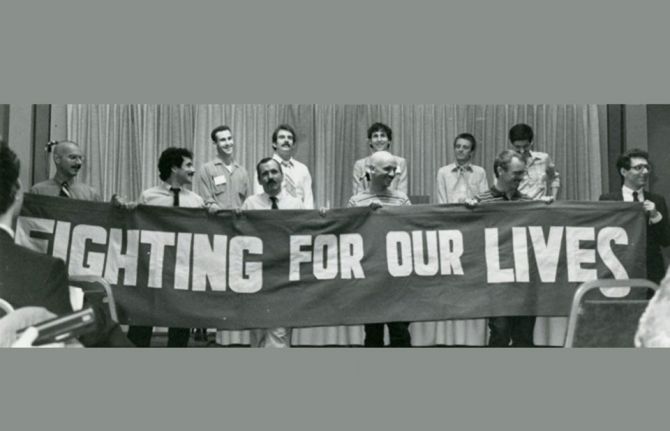
Feature Story
The Denver Principles: 40 years on
26 June 2023
26 June 2023 26 June 2023Text based on A Brief History of the Self-Empowerment Movement by Sean Strub, former Executive Director, The Sero Project
Forty years ago, visionary activists developed the Denver Principles manifesto, which shaped the active involvement of people living with HIV in the AIDS response. This was a historic first step towards the Greater Involvement of People with HIV (GIPA) principle, which promotes the meaningful participation of people living with HIV in decision-making, not as passive subjects but as protagonists fully involved in the response to AIDS.
This manifesto, written in June 1983, launched the self-empowerment movement for people living with HIV. As Sean Strub, former Executive Director of The Sero Project, writes, The Denver Principles document is historic in its assertion that those who have HIV have a fundamental and inalienable right to participate in decision-making that significantly impacts their lives and survival.” In language that has inspired people living with HIV over the last forty years, the manifesto asserts:
“We condemn attempts to label us as ‘victims,’ a term which implies defeat, and we are only occasionally ‘patients,’ a term which implies passivity, helplessness, and dependence upon the care of others.”
The Denver Principles outlined rights and responsibilities for people living with HIV and provided recommendations to healthcare professionals, family, and friends.
Today, our world has undergone important changes. Despite progress made in many areas of the AIDS response, stigma, discrimination and pervasive inequalities continue to harm the lives of millions of people living with and affected by HIV. So, have the Denver principles had an impact on the lives of the populations most affected by HIV over the last 40 years? Will the new challenges of our time demand a review and an update of the GIPA Principle? This is what leading HIV activists and UNAIDS have to say about it:
Erika Castellanos, Executive Director, Global Action for Trans Equality (GATE)
"The Denver Principles were the foundation of the GIPA Policy, which placed us, people living with HIV, at the center of the response. It gave us a voice; it gave us a seat at the table. Today, it is no longer enough; it is time to evolve from having a seat at the table to being the leaders of the table, the leaders in the HIV response."
Alex Garner, Director of Community Engagement, MPact Global
The Denver Principles were a watershed moment in the movement for the rights of people living with HIV. It’s been 40 years and the world, our communities, and the epidemic have fundamentally changed. A clear understanding of the intersectional issues that people living with HIV (PLHIV) face is essential for protecting and defending our rights. Key populations have been the most disproportionately impacted by this disease and an evolution of the Denver Principles needs to integrate the challenges faced by our communities and the structural homophobia and transphobia that have sustained this 42-year pandemic. PLHIV have a fundamental right to pursue a fulfilling sexuality and have control over their own bodies. An update of the Denver Principles requires advancing the audacity of a sexuality of people living with HIV, regardless of their viral load.
Rodrigo Olin, Board Co-chair, GNP+
Forty years on from this declaration, people living with HIV are still continuously treated and addressed as patients; passive entities who have no say about our treatments and the effects on our bodies – as though we are passive agents. People around the world are still diagnosed late, even in developed countries where tools to prevent and treat HIV are available. Challenges remain to effectively embrace and apply the GIPA principles in co-designing community interventions and HIV-care frameworks alongside physicians and researchers. HIV research at all levels requires the involvement of people living with HIV to continue moving forward the quality of life of people living with HIV, wherever they are in the world.
Joyce Ouma, Advocacy and Campaigns Officer, Y+ GLobal
I just learned of the Denver principles, and I am glad I did as through my advocacy journey, I have constantly been told by the seasoned advocates that I and other young people are lucky to be living with HIV now, now that there is minimal stigma, now that HIV has been differentiated, and now that we have access to antiretroviral treatment. This made me reflect on the journey that PLHIV have taken to belong.
The Denver principles are the cradle of the meaningful engagement of people living with HIV in all our diversity. As young people living with HIV, we have built upon the GIPA principles to advance our call for the ethical and meaningful engagement of young people in key decision-making spaces to ensure that the mistakes of the past are not repeated now. We now have people living with HIV clustered into networks to structure our engagement in key platforms. The Denver principles are still as relevant to us now as they were in 1983, and while we have a lot of milestones to celebrate 4 decades later, we are still lagging on the meaningful engagement of young people living with HIV.
The principles need to be revisited to reflect the modern challenges faced by populations living with HIV. Populations of young PLHIV and LGBTIQ are still blamed for the rising incidence rates despite us playing our role to maintain viral loads below detectable levels. Imagine being queer and living with HIV. We all still need to live with dignity.
Midnight Poonkasetwattana, Executive Director, APCOM Foundation
The adoption of the Denver Principles in the Asia Pacific region has been uneven. In our region, HIV prevalence is over five times higher for gay men and other men who have sex with men, transgender persons, and people who inject drugs. We did not reach the 2020 targets and sadly most countries and communities are not yet on-track to end AIDS by 2030.
Political leadership is needed to ensure that key populations and people living with HIV are part of the solutions and to ensure increased funding to adequately support key population-led and community-led organizations, networks, and services.
Sean Strub, Mayor of Milford, Pennsylvania, and Former Executive Director, The Sero Project
The Denver Principles impact goes far beyond the HIV epidemic, as the document has inspired people with various life-threatening or stigmatizing conditions around the world to assert their voices in the decision and policy-making that so profoundly affects their lives. Its fundamental message will not change, even as the document may be modified to reflect today's HIV epidemic and/or be made more broadly inclusive of other conditions. Integration of the Denver Principles ideals into healthcare, policy development and service delivery over the past 40 years has been remarkable, yet it is just the beginning. Change is slow and any paradigm shift as radical as that envisioned by the Denver Principles will meet resistance. But there is no stopping the movement that begun in that hotel room in Denver in 1983.
Vanessa Johnson, Co-Executive Director, RIBBON
We honor the courageous efforts of a group of men living with HIV who gave voice to a community of people who, in the early days of the AIDS epidemic, at times, were too fragile, too fearful, or were rendered invisible due to stigma, discrimination, and other systematic challenges.
Like most foundational or governing documents, the Denver Principles are applicable regardless of who is in leadership. Over the 40 years, we have witnessed a transition in national leadership in the United States from white gay men living with HIV to leadership that has grown more racially and ethnically diverse and inclusive of African Americans/Black, Latinx, Asian, Native American, etc., as well as sexual identities, sexual orientation, cultural expressions, and experiences, and with varying levels of accessibility.
Linda Scruggs, Co-Executive Director, RIBBON
As we celebrate the momentous 40th anniversary of the Denver Principles, we pay homage to a transformative document that has left an indelible mark on the AIDS response. Today, we stand on the shoulders of those courageous individuals who, in the face of adversity, gave voice to a community silenced by stigma, fear, and discrimination.
These principles have inspired countless individuals, empowering them to assert their rights and demand inclusion in decision-making processes that shape their lives. We must recognize that the journey toward achieving the vision of the Denver Principles is far from over. It is our collective responsibility to ensure that their voices are not only heard but amplified, as we strive for a more just and inclusive society.
In commemorating this milestone, we stand united in our commitment to uphold the principles' fundamental message: that every person, regardless of their background, deserves respect, dignity, and equal access to comprehensive care. The Denver Principles have become a cornerstone of our fight against stigma, discrimination, and structural inequalities, igniting a movement that refuses to be silenced.
Yvette Raphael, Executive Director, Advocates for the prevention of HIV
As we reflect on the past 40 years, we acknowledge the progress made and the lives touched by the principles' profound impact. Yet, we must also acknowledge the work that lies ahead. Change, especially transformative change, takes time and unwavering dedication. But together, as activists, advocates, and leaders, we have the power to shape a future where the Denver Principles become a reality for all. People living with HIV globally have benefitted from this vision of those who came before us. It is through their vision that we are able to live full and productive lives and we must never forget that. We are able to engage meaningfully in the response because of this declaration. Over the years women living with HIV become leaders in fighting for HIV prevention because of the Denver declaration showed us it could be done.
We are at a pivotal point in the fight against HIV. Our daughters, our children may face the same challenges as us. The focus now has to be on the prevention of HIV infection. We need to build on the GIPA principles to include the prevention of new HIV infections among adolescent girls and young women.
Why has the recognition and adoption of these principles been so uneven in the world? Because some countries still criminalize and stigmatize those living with HIV with impunity.
Immaculate Owomugisha, ICW Global
The Denver Principles are foundational to our human right to participate in the decision making that impacts our lives. GIPA has created opportunities for vibrant and meaningful engagement of communities of people living with HIV that have propelled the HIV response, however, persistent misogyny, intersectional stigma and discrimination continue to result in harmful tokenization of women living with HIV and spur lack of sufficient investments in networks of people living with HIV, particularly women’s networks around the world.
Neil McCulloch, Senior Policy Officer, Global Network of Sex Work Projects (NSWP)
Forty years on, little has shifted for sex workers and other key populations, who remain disproportionately impacted by HIV and accounting for over 70% of all new infections globally. The criminalisation of sex work, HIV status, drug use, same-sex sexual activity, and diverse gender identities, as well as persistent violence, stigma and discrimination, prevents the true meaningful involvement envisioned in the Denver Principles. With anti-rights narratives and regressive laws on the rise again, and increasingly shrinking funding available, we must re-double our efforts to remove these structural and societal barriers and ensure we prioritise key population-led activities, in order to realise the GIPA principles and truly move the dial in the HIV response.
Aditia Taslim, Advocacy Officer, International Network of People Who Use Drugs (INPUD)
“The HIV self-empowerment movement, catalyzed by the Denver Principles manifesto, has been important in galvanising the drug user movement. Although drug user activism has existed for decades, the Vancouver Declaration (2006) titled “Why the World Needs an International Network of Activists who Use Drugs,” not only served as the birth of International Network of People who Use Drugs (INPUD) but also, underlined the roots of all other harms and violations that people who use drugs experience—which are criminalisation, and the repressive and oppressive laws and policies that are fueled by prohibition, moralism, stereotypes and lies. The HIV crisis has provided legitimacy as well as resources for people who use drugs through provision of harm reduction services. Despite its success in bringing down number of new HIV infections in some regions, harm reduction has mostly become co-opted by a medicalised and pathologising approach, removing the rights to make choices regarding own bodies and lives. Only by dismantling prohibition, we will have a society that respects, protects, and promotes the right to self-determination over one’s body, decision and consciousness of people who use drugs.”
Christine Stegling, UNAIDS Deputy Executive Director, Policy, Advocacy and Knowledge.
“The Denver Principles continue to serve as a powerful reminder of the importance of the greater and meaningful participation by people living with HIV in shaping the policies and programs that affect their lives. As we commemorate the 40th anniversary of this groundbreaking document, UNAIDS remains committed to following this leadership, and continuing to put the voices and experiences of people living with HIV at the center of our efforts to end the epidemic.”


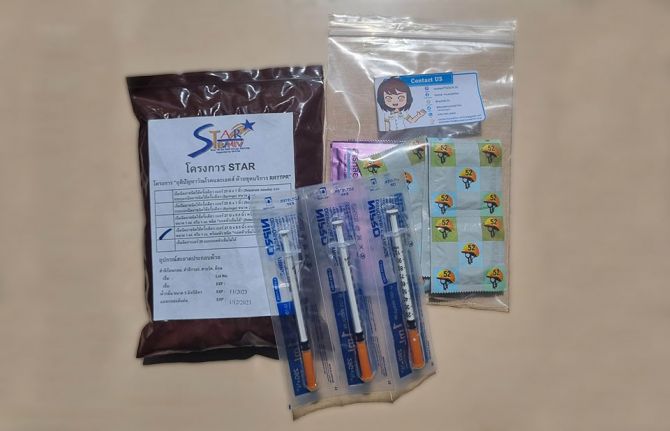
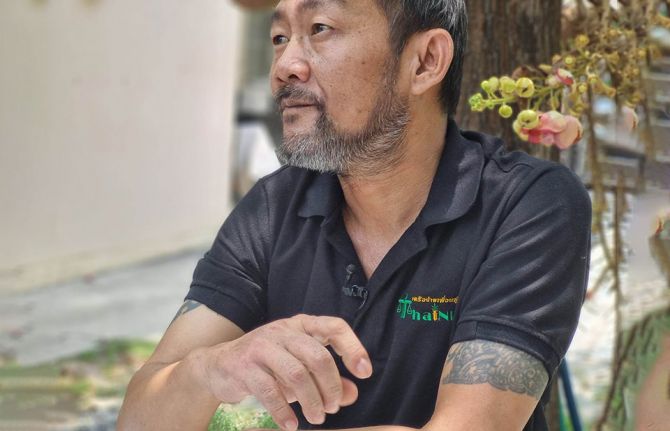
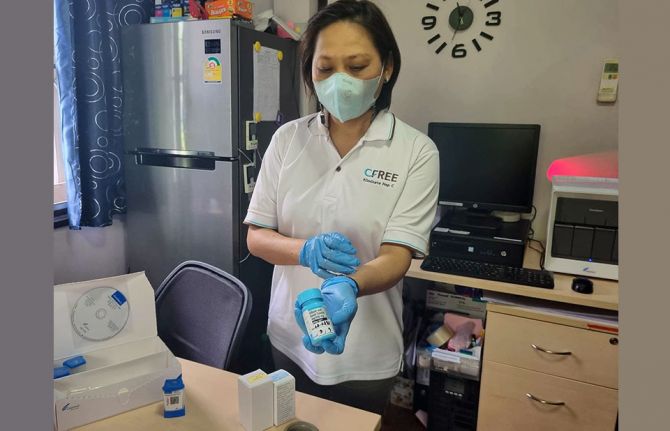
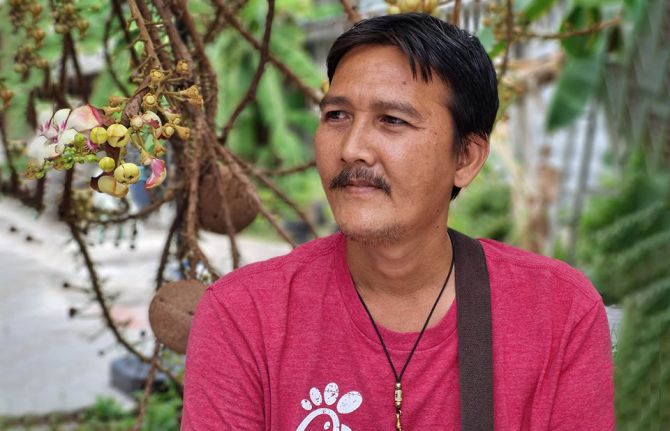
Feature Story
Compassionate care for people who use drugs in Thailand
26 June 2023
26 June 2023 26 June 2023At the Ozone Foundation clients talk about their drug use with as much openness as they discuss their jobs or families. In the yard of their Bangkok drop-in centre we sit under the cannon ball tree. Prapat Sukkeang shares his story first.
He is the Chair of the Thai Network of People who use Drugs (ThaiNPUD). He’s used substances of some kind for more than three decades. He says he started because of “small problems”. Once his family found out, he was immediately alienated: “the community and society around me became distant,” he remembers. Mr Prapat still uses. He might have yaba—a mixture of methamphetamine and caffeine—once a month.
“Ozone is the place I get knowledge about my health and about drug use. They give you information for your safety. I think without Ozone I might have overdosed,” he says plainly. “I feel very good to come here with service providers who see us as friends and provide healthcare services according to our needs. I feel respected. When we go to other places we always feel like criminals. If we go to a hospital they serve us last or reject us to get treatment. The service that we get is not equal to others.”
Jamon Aupama, a motorcycle taxi driver, lives with his wife in Bangkok. He goes to a state-run methadone clinic to avoid heroin withdrawal. He wishes he could take the methadone home and didn’t have to go there every day.
The experience at Ozone is different. Here the service delivery more closely matches his needs. He relies on Ozone for tests, clean equipment and “to hang out with friends”. He also goes for information.
“They give me detailed advice on how to protect myself from illness,” he says. “Some Ozone staff know personally about drug use, some do not. The trust comes from knowing them and the way they are trained,” Mr Jamon says.
From the ‘war on drugs’ to a more humane drug law
This people-centred service—and even these honestly told stories—were unimaginable just two decades ago. During the first three months of Thailand’s 2003 “war on drugs”, police killed almost three thousand people. Human rights groups reported widespread arbitrary arrests, beatings, forced confessions and compulsory detentions for “rehabilitation”. Use of HIV services by people who use drugs declined sharply. Terrified, people shrank into the shadows.
This chaotic context was the spark for Ozone’s formation. Back then they set up their first drop-in centres as safe spaces where clients could take a shower, have a meal and share their experiences.
Today the political and social climate is far different. A new Narcotics Law introduced in December 2021 provides for differentiated sentencing on drug crimes and alternatives to imprisonment for some offences. For the first time, the health and wellbeing of people who use drugs are being considered. There are provisions for harm reduction although it isn’t precisely defined. The United Nations Office on Drugs and Crime (UNODC) notes the continued existence in Thailand of compulsory treatment centres, deemed by the United Nations to be ineffective and a violation of human rights. Still, this more humane drug law is a first in Southeast Asia.
“Community-based treatment should be the way to provide care. Through community literacy we can understand the patient and the situation they face to get them to have a good outcome,” says Dr Phattarapol Jungsomjatepaisal, Director of the Department of Health Service Support at the Public Health Ministry.
Ozone’s holistic service package
Ozone Foundation’s Director, Verapun “Noy” Ngammee, explains that the organisation’s raison d'être is to respond to clients’ unique situations.
“They have bad experiences with stigma and discrimination,” he starts. “It’s difficult to trust people. Many of them have been suffering for a long time. We need to have peer organisations that are community-led and driven or you would not get clients coming to services. We respect the human dignity of all people. And we believe that safety is available to people before, during or after drug-use.”
Their model identifies each person’s specific risks and needs. They’ve found that much of the harm clients experience is not directly due to drug use, but rather to the environment—anything from the inability to access healthcare to harassment by police. Ozone employs a holistic approach that puts the client at the centre. One person might only require harm reduction counselling and tools while another is ready for support to quit.
The organisation collaborated with C-FREE, a laboratory service, for screening and monitoring of Hepatitis B and C, HIV and other sexually transmitted infections (STIs). They also offer the Hepatitis B vaccine. Research nurse Kewalin Kulprayong says her team has a welcoming approach.
“Clients know it is not a hospital,” she says. “It is safe. They can speak about everything here, drugs also.”
A doctor is available once a week. Some conditions can be treated at Ozone. In other cases, clients are referred to government facilities but with the benefit of peer support. These services are critical. An estimated eight per cent of people who inject drugs in Thailand are living with HIV while Hepatitis C prevalence is 42%.
"Universal Health Coverage in Thailand paves the way for comprehensive care, including essential services like HIV testing, pre-exposure prophylaxis or PrEP, treatment referrals, and screening and treatment for STIs and Hepatitis C. However, despite their inclusion in benefit packages, individuals who inject drugs face significant barriers due to pervasive stigma and discrimination, including self-stigma," says Patchara Benjarattanaporn, UNAIDS Country Director. “In this landscape, key population-led health services like Ozone’s emerge as invaluable one-stop shops, providing stigma-free care and ensuring that no one is left behind, especially those who use and inject drugs.”
Looking toward the future
Each Ozone client has their own dreams. One wants to run for political office. Another hopes to get his gender affirming surgery soon. A third imagines a life in the countryside with a small farm: “Not too many people,” he says with a chuckle. “Then I get in more trouble”.
He came to Ozone because he was depressed, anxious and dealing with a sexually transmitted infection.
“I did not have the confidence to go to a hospital and say, ‘I want treatment’. But I knew if I did nothing it would get worse. At Ozone they understand. They give me guidance. They’ve advised me to use social security to get mental healthcare. They tell me ‘people make mistakes sometimes’. I am one of those guys who makes many mistakes,” he confesses with another uneasy laugh. “But now the mistakes are getting less.”
A group of journalists visited the Ozone Foundation as part of the UNAIDS, UNDP, APN Plus and USAID/PEPFAR Southeast Asia Regional Workshop on HIV-related Stigma and Discrimination in Bangkok, Thailand on June 8, 2023. Learn more about this novel training.
Region/country

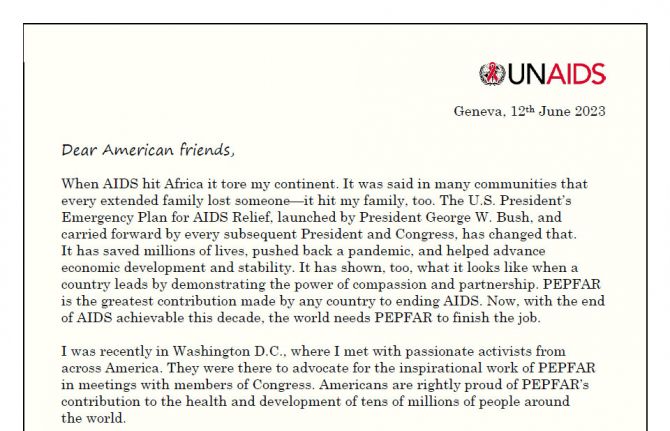
Feature Story
A Thank You letter to the American people from the Executive Director of UNAIDS: PEPFAR is the Greatest Contribution Made by Any Country to Ending AIDS
12 June 2023
12 June 2023 12 June 2023To mark the 20th Anniversary year of PEPFAR, UNAIDS Executive Director has written a letter to the American people.
You can read the text of her letter below. Click here to be able to view the actual letter.
Dear American friends,
When AIDS hit Africa it tore my continent. It was said in many communities that every extended family lost someone—it hit my family, too. The U.S. President’s Emergency Plan for AIDS Relief, launched by President George W. Bush, and carried forward by every subsequent President and Congress, has changed that. It has saved millions of lives, pushed back a pandemic, and helped advance economic development and stability. It has shown, too, what it looks like when a country leads by demonstrating the power of compassion and partnership. PEPFAR is the greatest contribution made by any country to ending AIDS. Now, with the end of AIDS achievable this decade, the world needs PEPFAR to finish the job.
I was recently in Washington D.C., where I met with passionate activists from across America. They were there to advocate for the inspirational work of PEPFAR in meetings with members of Congress. Americans are rightly proud of PEPFAR’s contribution to the health and development of tens of millions of people around the world.
In the last 20 years, the U.S. Government has invested more than US$110 billion to support the response to HIV and AIDS in 55 low and middle-income countries with the highest burden of HIV. The results that PEPFAR has helped make possible are remarkable—the rate of new HIV infections has fallen by almost half, AIDS-related deaths have been reduced by two thirds, and three-quarters of people living with HIV are on life-saving medicine. Millions of deaths have been prevented, and millions of babies have been born HIV-free.
Through the global HIV response, PEPFAR’s work has strengthened health and community systems, delivering broader outcomes for health, economic and human development and equity, accelerating progress towards achievement across the Sustainable Development Goals. Annually, PEPFAR has provided support and services through more than 70 000 facility and community health clinics; 3000 laboratories and nearly 30 national reference laboratories, as well as more than 340 000 health care and community workers. PEPFAR’s investment in health systems contributes significantly to national surveillance and health information capacities, which were critical to national COVID-19 responses and remain crucial for managing future pandemics and other public health threats.
PEPFAR has demonstrated the invaluable role of community engagement and civil society for advancing health and sustainable development, from helping faith-based organizations providing essential HIV care and support services across Africa, to ensuring support for Ukrainian civil society as the front-line of the national HIV response throughout the war.
As an important part of U.S. diplomacy, PEPFAR’s unflinching commitment to stand up against discrimination and inequities in HIV services sends a powerful signal that the world needs to ensure that nobody is left behind if we are to end AIDS.
PEPFAR works through partnerships. I look forward to my upcoming joint mission in Africa with PEPFAR and the Global Fund. At UNAIDS, which works on the ground in over 90 countries, including all 55 PEPFAR partner countries, we see the difference PEPFAR makes every day.
Twenty years ago, President Bush launched the creation of PEPFAR by announcing that “seldom has history offered a greater opportunity to do so much for so many”. In 2003, U.S. Congress moved swiftly to authorize PEPFAR within weeks. PEPFAR legislation was reauthorized in 2008, 2013 and 2018, with the bipartisan leadership and support of the U.S. Congress. With the lives of tens of millions of people hanging in the balance, countries, communities and UNAIDS are confident that we can rely on the American people, and that the U.S. Government and the U.S. Congress will continue to demonstrate unparalleled leadership through support for PEPFAR.
What was once a dream, but which PEPFAR’s partnership makes possible—the end of AIDS by 2030—is a reflection of the values of the American people. So today I wanted to write to you to say Thank You.
Yours,
Winnie Byanyima
UNAIDS Executive Director
Under-Secretary-General of the United Nations
Partners
Related

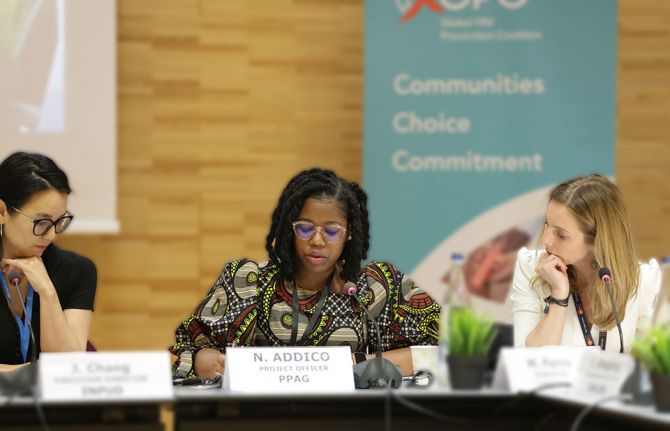
Feature Story
The urgency of HIV prevention among adolescent girls and young women
01 June 2023
01 June 2023 01 June 2023My name is Naadu Awuradwoa Addico and I work as a Project Officer at Planned Parenthood Association of Ghana (PPAG). On 24 May, I participated in a Ministerial meeting organized by the Global HIV Prevention Coalition titled High-Level Dialogue on accelerating HIV prevention and preparing for future pandemics.
In that meeting I shared the story of Abena, a young woman from Ghana who, at age 19, contracted HIV from a 40-year-old man who coerced her into transactional sex with the promise to fund her high school fees.
While I avoid the obvious details, I ask: What if Abena was empowered to negotiate for safer sex? What if she had access to Pre-Exposure Prophylaxis (PrEP)? What if she lived in a community with robust social support systems that catered for her needs?
You see, these are some of the reasons why HIV prevention cannot wait!
Many adolescent girls like Abena face poverty, disability, marginalization, discrimination and exploitation. These factors perpetuate HIV transmission and hinder an effective response to AIDS. Just last year, an adolescent girl or young woman acquired HIV every two minutes.
This is beyond alarming!
Policies and laws must allow girls to not only access HIV prevention services like PrEP, but also to complete their education regardless of their background and circumstances. Abena need not have paid such a heavy price to get the support she needed for her schooling.
In reference to the popular saying ‘teamwork makes the dream work’, young women and girls have a crucial part to play on this journey of ending AIDS. So, I appealed to Governments in the meeting as well as global leaders, donors and all stakeholders to provide resources and commit to ensuring girls like Abena can have equal access to knowledge, support and safe spaces to remain HIV free.
When you are developing and implementing HIV prevention programmes for young people and making critical decisions about our health and well-being, let our voices be heard and echoed. We want to work with you.
Our work
Watch
Related

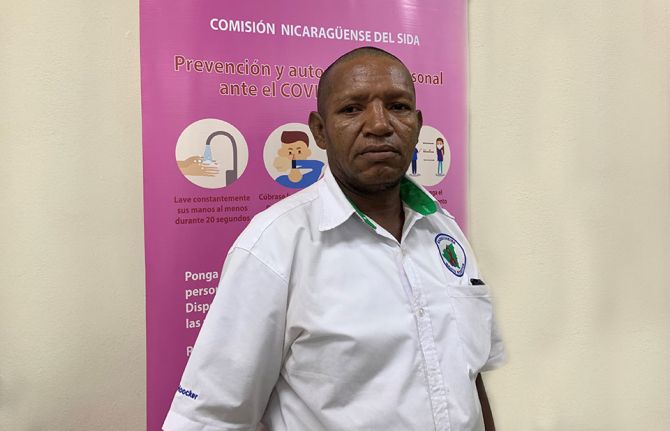
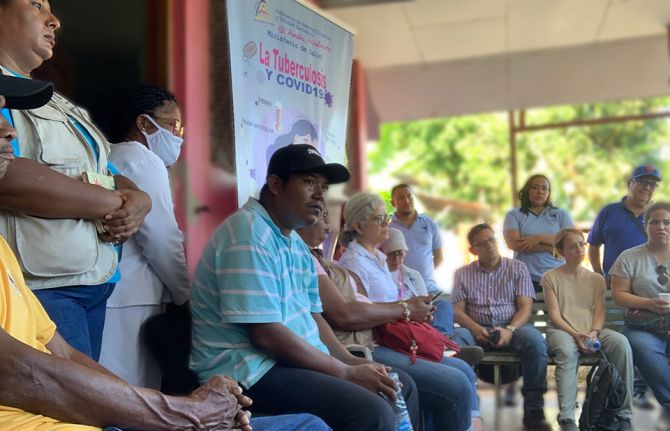
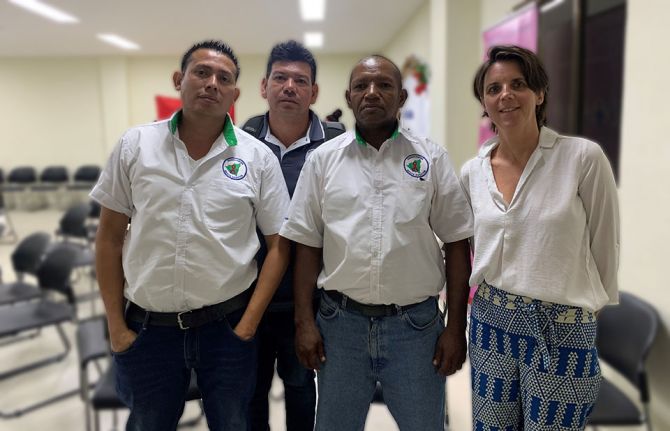
Feature Story
How working with providers of natural and holistic medicine for complementary self-care techniques is helping Nicaragua increase adherence to HIV medicines and reduce new infections
29 May 2023
29 May 2023 29 May 2023Right after taking his HIV treatment each morning, Antonio Hooker prepares a kit of fresh herbs and fruits he has bought at the local market to cross the Bilwa area, a village on the northern Caribbean coast of Nicaragua, as a health promoter for the Association of People Living with HIV (ASONVIHSIDA). He strengthens HIV prevention knowledge among vulnerable groups in his indigenous Miskitu community. He also teaches community leaders and people living with HIV or other health problems to use the power of natural medicine in conjunction with antiretroviral medicines to improve their immune systems.
Antonio is one of the dozens of volunteers and community promoters who have been certified by the Nicaraguan AIDS Commission, the Ministry of Health and the Institute of Natural Medicine and Complementary Therapies through training in "Self-Care in Sexual Reproductive Health and HIV from the Perspective of Natural Medicine".
Since his diagnosis 17 years ago, Antonio has learned the importance of self-care. He now shares his knowledge and training experiences with family members and others living with HIV in remote communities along the Nicaraguan coast.
"The course opened my mind to the importance of natural medicine and traditional practices, such as massage and meditative activities," says the health promoter. "We know these techniques work because we see improvement in our health while seeing progress in adherence to HIV treatment, as well as strengthening social, community networks and relationships within the families of people living with HIV."
The course "Self-care in Sexual Reproductive Health and HIV from the Perspective of Natural and Holistic Medicine" aims to provide guidelines on self-care for people living with HIV or similar conditions and their families. Through the appropriate use of medicinal plants, reflexology (a system of massage used to relieve tension and treat illness, based on the theory that there are reflex points in the feet, hands and head linked to each part of the body) and complementary therapies, such as the practice of the Chinese martial art and system of callisthenics well known as Tai Chi Chuan, which consists in sequences of slow controlled movements.
"The objective is to build skills and abilities among people living with HIV, volunteers and active community members to develop a comprehensive approach to sexual and reproductive health, sexually transmitted infections (STIs) and HIV," explains Dr Enrique Beteta, Nicaragua's Deputy Minister of Health. "It also allows people to access information and linkage to health services at the local level to take care of their health and the well-being of those around them."
The services harnessing natural medicine are complementary, not alternative, to HIV medicines. Indeed, the programmes have helped increase uptake of and adherence to HIV medicines.
Nicaragua’s comprehensive approach and partnership with communities has helped it to advance progress on treatment and prevention. Since 2010, Nicaragua has experienced a 20% decrease in new HIV infections, while in Latin America, new infections have increased by 5% in the same period. About 11 000 people live with HIV in the country, and 90% have been tested and know their positive diagnosis, above regional (82%) and global (85%) rates.
The course offers 84 hours of theoretical and practical training, a quarter of which is focused on Sexual and Reproductive Health and HIV modules. The certification also focuses on putting people at the centre, not only as beneficiaries but also as key protagonists, participating, exercising and demanding access to their rights for equality and equity.
"The course also aims to identify in people the autonomy to make decisions, as transformative agents, in a framework of respect, solidarity and social justice," explains Marie Engel, Director of the UNAIDS Multi-country Office for Guatemala, Honduras and Nicaragua. "Working to eliminate stigma and discrimination is also an important outcome of this initiative."
Watch
Region/country

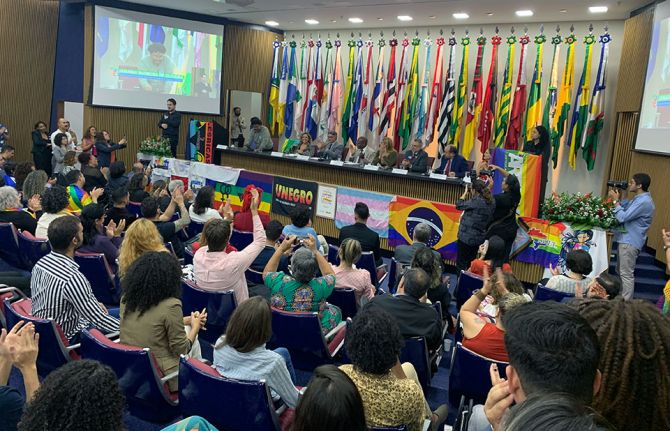

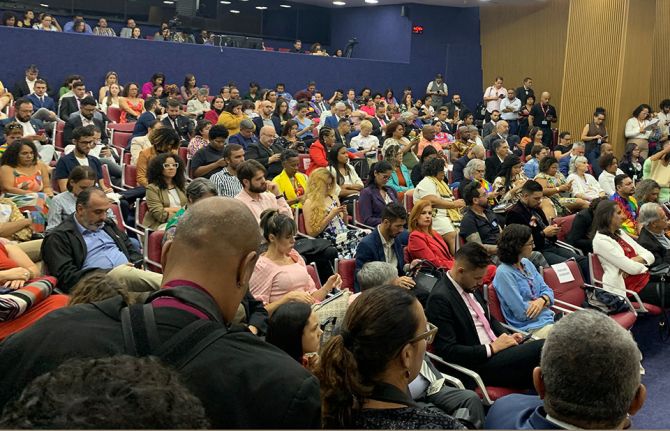
Feature Story
Brazil announces its commitment to the global initiative against HIV-related stigma and discrimination
19 May 2023
19 May 2023 19 May 2023Brazil has joined the 34 countries that are part of the Global Partnership to take action to eliminate all forms of HIV-related stigma and discrimination. The country's entry into this group of nations was announced at a celebratory event of the International Day Against Homophobia, Biphobia, and Transphobia, held in Brasilia, Brazil’s capital and organized in partnership by UNAIDS, ILO, and the Ministry of Human Rights and Citizenship.
The Global Partnership is an initiative launched through a call for action from the NGO Delegation to the UNAIDS Programme Coordinating Board (PCB) in 2018 to remove HIV related stigma in six settings: healthcare, justice, community, workplace, educationa and humanitarian. It is co-convened by UNAIDS, UN Women, the United Nations Development Programme (UNDP), the Global Network of People Living with HIV, and the Global Fund to Fight AIDS, Tuberculosis, and Malaria. It is also supported by a technical working group composed of 10 United Nations agencies and 24 partners and civil society organizations.
With Brazil, now 35 countries have formally joined the Global Partnership, committing to act against HIV-related stigma and discrimination in the contexts of healthcare services, educational settings, workplaces, justice systems, domestic and community environments, emergency systems, and humanitarian crises.
According to Luisa Cabal, the Regional Director of UNAIDS in Latin America, Brazil's entry into the Global Partnership is a significant step in the collective response against HIV-related stigma and discrimination in Latin America and the world. "By joining this initiative, Brazil reaffirms its commitment to defending human rights, promoting social inclusion, and eliminating barriers to access prevention, diagnosis, treatment, and ongoing response to HIV," she explains.
By joining the Global Partnership, Brazil will have access to a platform that will allow the country to share experiences and best practices with the other participating countries, creating opportunities for collective learning, strengthening the joint response to HIV-related stigma and discrimination.
"It is important to highlight that by joining the Global Partnership, Brazil will also reinforce its leadership role in the region and global diplomacy for health and human rights, demonstrating its commitment to equity and social justice," emphasizes Luisa Cabal.
It is indeed a precedent for the GP that commitment to join the Global Partnership has been witnessed by two Ministers.
Minister of Human Rights and Citizenship Silvio Almeida reiterated his unrestricted support and commitment to public policies promoting and protecting the rights of LGBTQIA+ people. ”For those who suffer violence, and are killed simply for being who they are, these people will be protected in a public commitment, and I renew this commitment not only as Silvio Almeida, but as Minister of State for Human Rights of Brazil” emphasized H.E.
Representing the Ministry of Health Helvécio Miranda, Secretary of Specialized Health Care, similarly shared the Ministry's commitment to embrace the agenda of LGBTQIA+ rights and ensure comprehensive healthcare access for all people emphasizing on a gender approach, and with a special focus on those at risk, with specific needs, or experiencing different forms of violence.
Vinícius Pinheiro, Director for Brazil at ILO, embraced the significance of the Global Partnership in promoting social justice and decent work with inclusion and opportunities for all people so that no one is left behind.
Region/country
Related

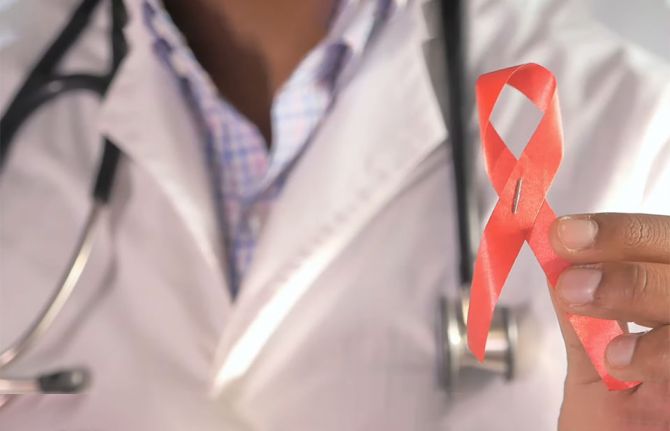
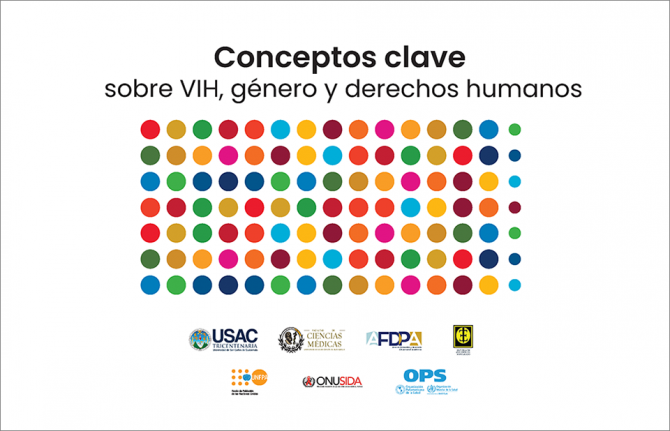
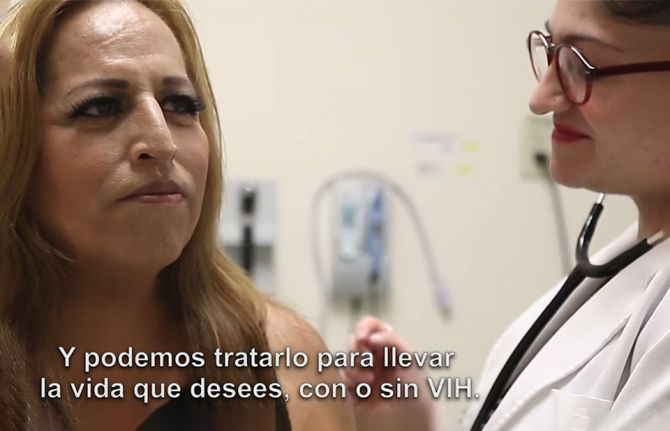
Feature Story
Virtual course on HIV, gender and human rights: empowering medical teachers in Guatemala
18 May 2023
18 May 2023 18 May 2023The University of San Carlos de Guatemala (USAC) Faculty of Medical Sciences, in collaboration with UNAIDS, the World Health Organization (WHO), and the United Nations Population Fund (UNFPA), launched an online course titled "Conceptos clave sobre VIH, Género y Derechos Humanos" (Key Concepts on HIV, Gender, and Human Rights). The four-module course is designed to provide teaching staff with detailed knowledge about key concepts related to HIV, its treatment and prevention, and the national and international legal framework guiding the response to HIV, as well as the gender and human rights dimensions of the epidemic.
With an estimated three new HIV infections each day in Guatemala and only 73% of the estimated 31,000 people living with HIV receiving antiretroviral treatment and persisting high level of stigma and discrimination towards people living with HIV, the course is a significant step towards addressing the country's HIV challenges. The course aims to provide teaching staff and students with the necessary resources to promote, protect, and fulfill the human rights of adults, adolescents, and children living with or at risk of acquiring HIV, in all their diversity.
The course consists of 140 hours of study, including 70 hours of theory and 70 hours of practice, and will be undertaken between May and August 2023. Course participants will join virtual classes and synchronous group workshops and will have to submit the required tasks according to a work schedule.
The course covers four modules: Module 1 - Update on HIV and AIDS; Module 2 - National and international legal framework for the response to HIV; Module 3 - Health sector Policy framework for HIV response; Module 4- Key concepts on gender and human Rights.
During the inauguration, Marie Engel, UNAIDS Country Director, expressed her hope that participants would enjoy taking the course as much as she and other partners had in developing it. She also emphasized that "the course will be enriched with participants' individual knowledge and experiences, their doubts and concerns. There is obviously a lot of knowledge and wisdom among course participants that the facilitators will strive to capture."
Dr. José María Gramajo, General Coordinator of the USAC Faculty of Medical Sciences' Area of Teachers and Postgraduate training, highlighted that "this refresher course will contribute to the professional development of faculty teachers, sharing with them the latest knowledge about innovations related to HIV prevention, detection, and care, and ensuring an in-depth understanding of cross-cutting issues relevant to HIV and other public health problems."
Teaching staff and students are catalysts with the power to change the national response to HIV. As stated by Dr. Mirna Herrarte, Coordinator of the national HIV, STI, and AIDS program, "I am glad to know that there are so many professionals who want to know more about HIV. In the country, HIV treatment schemes are constantly reviewed. As an anecdote, Guatemala had more than 200 antiretroviral schemes a year ago. Under my leadership, we have reduced those schemes by 75%."
Inequalities persist in the most basic health and HIV services, such as access to screening, treatment, and condoms. USAC's collaborative initiative is an important step towards ensuring that all sectors, including academia, are engaged in ending social, economic, and legal inequities. The University of San Carlos de Guatemala is the largest and oldest university in Guatemala, and the only national and public university in the Central American country.
Watch
Region/country
Related

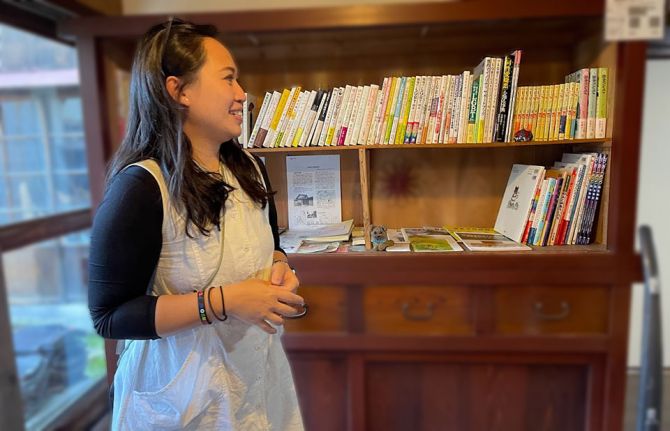
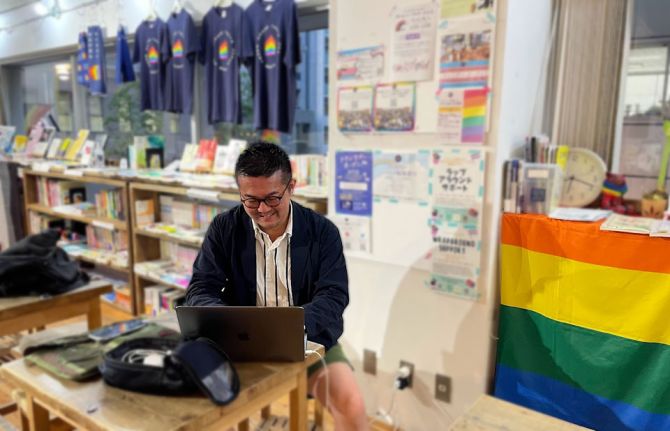
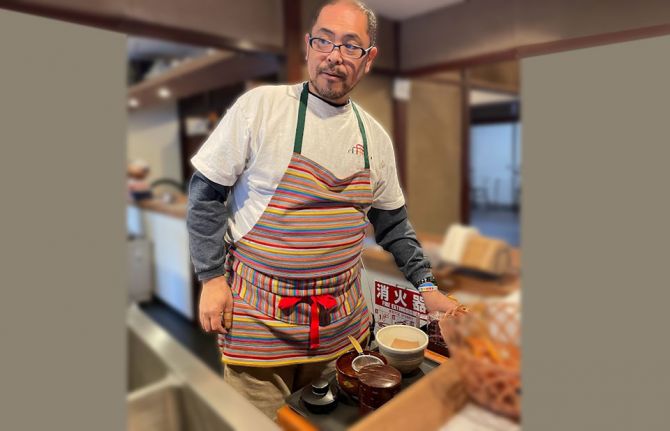
Feature Story
A rainbow of hope for LGBTQI+ people in rural Japan
17 May 2023
17 May 2023 17 May 2023For many years Mami taught at a state school in Kanazawa, Japan. When she started transitioning and dressing in a less masculine way, her colleagues and supervisors frowned upon it. Finally, she was fired.
As a transgender woman in a small, conservative city, Mami struggled to find another job and felt very isolated. “When a friend invited me to work at the Kanazawa Rainbow Pride community centre, I was happy to have a place where I was accepted,” she said.
Founded in 2022, the Kanazawa LGBTQI+ centre is in a 150-year-old tea house in what was the city’s former Samurai marketplace. The sliding panels allow for a variety of configurations depending on gatherings. Mami and her friend, Kennosuke Okumara, Head of the Kanazawa centre’s secretariat, were serving tea and coffee in the open bar kitchen to visitors.
“Before I worked in Tokyo but I returned to my native city,” Mr Okumara explained. “The problem was that there were and are no options for gay people here,” he said. Mr Okumara lives with HIV and laments the fact that HIV and LGBTQI+ issues are still taboo. “There is so little information, it is a shame and I am here to share my experience and share more awareness,” he said.
Mixing a green tea in a small cup with a bamboo whisk, Mr Okumara in his apron paused and looked at Mami. “This is a safe space for all here,” he said.
Diana Hoon, the centre’s co-President called the centre a beacon of hope. “We are like a lighthouse in a very conservative, patriarchal society,” she said. Showing off the many pamphlets and flyers varying from knowing one’s HIV status to the Pride parade in the city to books about coming out in the makeshift library, Ms Hoon said that the centre not only was attracting more people, they also had 10 volunteers helping out... many of whom are mothers.
"Our parent seminars about LGBTQI+ have had a lot of impact,” she said. “People share stories about their children and a connection is made.”
As a Singaporean living with another woman who is originally from Kanazawa, Ms Hoon feels like she is doing her part to provide a lifeline for people and push for more acceptance.
“Among our many priorities we do HIV awareness as well as advocate for gender neutral toilets, gender neutral school uniforms and most importantly marriage for all, which does not yet exist in Japan,” she said. She also hopes that within five years they can add a shelter to house LGBTQI+ people.
In her mind there have been incremental steps. “Transgender people have been more outspoken of late and we have LGBTQI+ champions among the community,” she said.
Such a role model is Gon Matsunaka, Founder and former President of the Pride House Tokyo consortium and the Director of the Marriage for All movement in Japan. A former advertising executive for one of Japan’s top firms, Dentsu, Mr Matsunaka hid his sexuality for decades. “For me there was no future in my rural hometown, so I left for Tokyo,” he said. He then studied in Australia, worked in Tokyo as well as New York City and ultimately left his firm.
He came out as gay in 2010 and fixated on providing a community centre in Tokyo. The Olympic Games seemed like a golden opportunity.
The COVID pandemic struck, putting a lot of projects on hold but Mr Matsunaka and his team did not give up.
“In May 2020, survey after survey revealed that LGBTQI+ youth felt unsafe at home or they had lost touch with people, this really motivated me,” he said. He had secured 15 sponsors for a temporary LGBTQI+ safe space during the Olympic and Paralympic Games, called Tokyo Pride House. With the postponing of the Games however, the centre was cancelled.
The team persuaded the sponsors to shift their funding and create a permanent space. Years after the Olympics, Tokyo Pride House still stands proud within walking distance of the popular queer-friendly Shinjuku area in Tokyo.
In Kanazawa, Mr Matsunaka had linked up with Ms Hoon to start a Pride parade in 2021. Out of that success came the idea of a community centre.
Mr Matsunaka is particularly proud that the prefecture (city district) contributed half the funds to the Kanazawa Nijinoma centre. The rest was a result of crowdfunding.
Beaming in the Tokyo Pride House surrounded by rainbow flags, he said, “I never dreamed of this and never imagined it could be possible especially in a small city like Kanazawa.”
In his mind, women have been key. “Women have 2nd rank to men especially in rural areas like Kanazawa, so they have been our greatest allies to change the patriarchal mentalities,” he said. “Mind you we have a lot more work ahead, but I only want to go forward not backwards."
On International Day Against Homophobia, Biphopia and Transphobia (IDAHOT), UNAIDS stands in solidarity with the LGBTQI+ community. We must unite and celebrate diversity; a society where everyone, no matter where they live or whom they love, is able to live in peace and security; a society where everyone can contribute to the health and well-being of their community.














